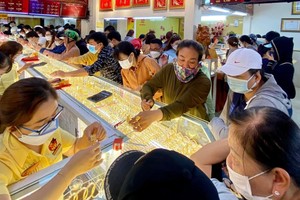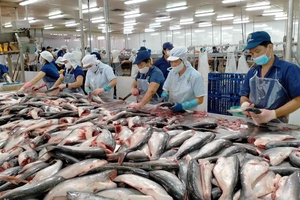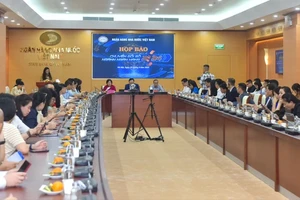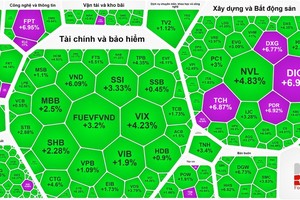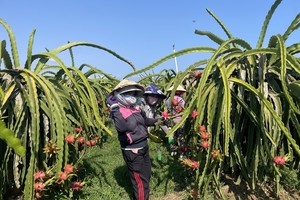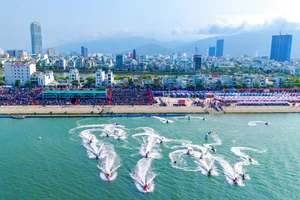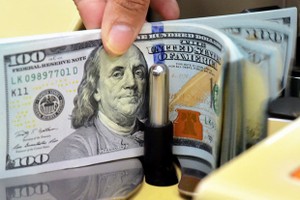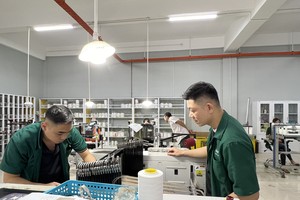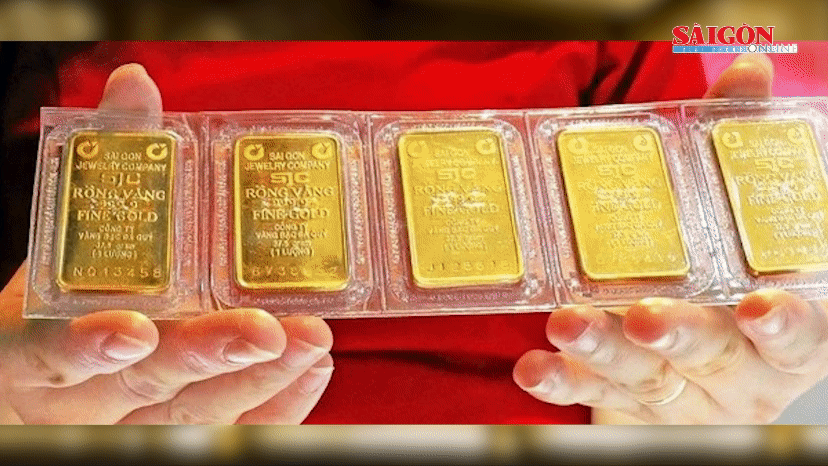 High gasoline prices seriously affect the pocket of consumers. (Photo: SGGP)
High gasoline prices seriously affect the pocket of consumers. (Photo: SGGP)
In localities far from ports and key fuel wholesalers, the actual retail gasoline prices are above VND33,000 per liter. The oil price in this adjustment increased shockingly, with an average of around VND2,500 per liter. Specifically, diesel oil 0.05S surged to VND29,020 per liter, up VND2,626 per liter, and kerosene went up to VND27,839 per liter, up VND2,493 per liter.
Petrol products escalate worldwide
According to Prof.-Dr. Dinh Trong Thinh, the Vietnam Academy of Finance, every time petrol prices increase, it has a direct impact on the price level and the pocket of people, causing a domino effect because petroleum products are input materials in many fields of the economy, including transportation, aviation, tourism, fishing, agricultural production, travel demand, and production and business activities.
However, Prof.-Dr. Dinh Trong Thinh said the fact that gasoline prices hit a record high and continue to climb is force majeure because gasoline prices are escalating worldwide. Although Vietnam has gained autonomy in about 70 percent of petroleum reserves for the market and depends only 30 percent on imports, the country still has to import crude oil from other countries for refining. Meanwhile, Vietnam's exploited oil output does not serve the domestic consumer market.
According to the World Petroleum Council, although the world gasoline prices have increased by 70-80 percent in recent months, the increase in gasoline prices in Vietnam is still 12 percent lower than in the world. According to Prof.-Dr. Dinh Trong Thinh, the current solution to control gasoline prices is that the Government can consider reducing or exempting some taxes that account for a high percentage of the gasoline selling prices, or subsidizing prices like Malaysia, including special consumption, value-added, import, and environmental protection taxes.
According to calculations, taxes account for about 29-31 percent of gasoline prices and about 20-30 percent of oil prices. However, some taxes may have reached their limit of exemption, such as the import tax on gasoline. Currently, Vietnam is applying an import tax of about 8 percent, and in some other countries, like South Korea, the import tax is also kept at 8 percent. According to the roadmap, it will aim at an import tax rate of only zero percent. As for special consumption tax, it is difficult to exempt or reduce because the purpose of this tax is to limit excessive consumption of petrol products.
Prof.-Dr. Dinh Trong Thinh said that if the Government reduces the special consumption tax on gasoline, it is not the poor consumers who will enjoy it because the demand is not high. Instead, FDI enterprises and small businesses which use fuel-intensive technologies and equipment will benefit.
Subsidies for consumers needed
According to Prof. Dr. Dinh Trong Thinh, the Government needs to forecast whether the global fuel prices will continue to rise in the coming time or not to make accurate decisions, such as subsidies on consumers and temporary exemption and reduction of applicable taxes and fees, thereby preventing gasoline prices from advancing in the near future. "The government needs to cut the coat according to its cloth and make a decisive, timely, and appropriate decision," Thinh said. He added that tax exemption and reduction would help people recover amid constant price hikes.
Sharing the same view, Mr. Tran Hoang Ngan, a National Assembly deputy of Ho Chi Minh City, said that inflations in other countries had increased highly. However, Vietnam has only been affected by one factor, cost-push inflation (petroleum prices), while the demand-pull factors have not had much impact. However, in the coming time, the influence of the demand-pull factors will increase because of public investment disbursement of expressway projects, the Ring Road No.3 in HCMC, and the economic recovery package.
Therefore, the Government needs to control prices and curtail the cost-push factor, which means reducing taxes on petroleum products to reduce the costs of enterprises. Only then can we create a stable macroeconomic foundation, ensure that inflation is controlled according to the target, and the total investment is increased, thereby, ensuring the expected economic growth.
Mr. Tran Hoang Ngan forecasted that, in the coming time, world gasoline prices would continue to climb. Therefore, the Government must soon submit to the NA Standing Committee and the NA to reduce the environmental protection tax and special consumption tax, or taxes and fees related to petrol products, in general. Currently, other countries have taken these measures, and Vietnam has the conditions to do it because we can exploit oil and gas. Therefore, it is necessary to use this advantage to support the economy. Currently, petrol prices in Vietnam are higher than those of many countries, such as Japan, Malaysia, Indonesia, and the US. Therefore, Vietnam must have an immediate support policy to ensure the macro-economy.
Petrol products escalate worldwide
According to Prof.-Dr. Dinh Trong Thinh, the Vietnam Academy of Finance, every time petrol prices increase, it has a direct impact on the price level and the pocket of people, causing a domino effect because petroleum products are input materials in many fields of the economy, including transportation, aviation, tourism, fishing, agricultural production, travel demand, and production and business activities.
However, Prof.-Dr. Dinh Trong Thinh said the fact that gasoline prices hit a record high and continue to climb is force majeure because gasoline prices are escalating worldwide. Although Vietnam has gained autonomy in about 70 percent of petroleum reserves for the market and depends only 30 percent on imports, the country still has to import crude oil from other countries for refining. Meanwhile, Vietnam's exploited oil output does not serve the domestic consumer market.
According to the World Petroleum Council, although the world gasoline prices have increased by 70-80 percent in recent months, the increase in gasoline prices in Vietnam is still 12 percent lower than in the world. According to Prof.-Dr. Dinh Trong Thinh, the current solution to control gasoline prices is that the Government can consider reducing or exempting some taxes that account for a high percentage of the gasoline selling prices, or subsidizing prices like Malaysia, including special consumption, value-added, import, and environmental protection taxes.
According to calculations, taxes account for about 29-31 percent of gasoline prices and about 20-30 percent of oil prices. However, some taxes may have reached their limit of exemption, such as the import tax on gasoline. Currently, Vietnam is applying an import tax of about 8 percent, and in some other countries, like South Korea, the import tax is also kept at 8 percent. According to the roadmap, it will aim at an import tax rate of only zero percent. As for special consumption tax, it is difficult to exempt or reduce because the purpose of this tax is to limit excessive consumption of petrol products.
Prof.-Dr. Dinh Trong Thinh said that if the Government reduces the special consumption tax on gasoline, it is not the poor consumers who will enjoy it because the demand is not high. Instead, FDI enterprises and small businesses which use fuel-intensive technologies and equipment will benefit.
Subsidies for consumers needed
According to Prof. Dr. Dinh Trong Thinh, the Government needs to forecast whether the global fuel prices will continue to rise in the coming time or not to make accurate decisions, such as subsidies on consumers and temporary exemption and reduction of applicable taxes and fees, thereby preventing gasoline prices from advancing in the near future. "The government needs to cut the coat according to its cloth and make a decisive, timely, and appropriate decision," Thinh said. He added that tax exemption and reduction would help people recover amid constant price hikes.
Sharing the same view, Mr. Tran Hoang Ngan, a National Assembly deputy of Ho Chi Minh City, said that inflations in other countries had increased highly. However, Vietnam has only been affected by one factor, cost-push inflation (petroleum prices), while the demand-pull factors have not had much impact. However, in the coming time, the influence of the demand-pull factors will increase because of public investment disbursement of expressway projects, the Ring Road No.3 in HCMC, and the economic recovery package.
Therefore, the Government needs to control prices and curtail the cost-push factor, which means reducing taxes on petroleum products to reduce the costs of enterprises. Only then can we create a stable macroeconomic foundation, ensure that inflation is controlled according to the target, and the total investment is increased, thereby, ensuring the expected economic growth.
Mr. Tran Hoang Ngan forecasted that, in the coming time, world gasoline prices would continue to climb. Therefore, the Government must soon submit to the NA Standing Committee and the NA to reduce the environmental protection tax and special consumption tax, or taxes and fees related to petrol products, in general. Currently, other countries have taken these measures, and Vietnam has the conditions to do it because we can exploit oil and gas. Therefore, it is necessary to use this advantage to support the economy. Currently, petrol prices in Vietnam are higher than those of many countries, such as Japan, Malaysia, Indonesia, and the US. Therefore, Vietnam must have an immediate support policy to ensure the macro-economy.
Mr. LE TRUNG TINH, Chairman of HCMC Passenger Transport Association: Transport enterprises have had to tighten their belts
Gasoline and oil price hikes are sending the transportation industry into an extremely difficult situation for the following reasons. Firstly, the fuel cost accounts for about 30-40 percent of the total operating cost of the vehicle. Secondly, due to the influence of the pandemic, the demand for transport, especially passenger transport, is extremely low. Therefore, even if transport enterprises want to increase fare rates to cover costs, they dare not to for fear of losing passengers. Most transport enterprises have had to tighten their belts, shrink the operation scale, and lay off staff to survive.
In this context, the NA and the Government should reduce further taxes and fees related to petrol products to help reduce their prices. Especially, the special consumption tax should not be levied on gasoline because it is an essential commodity and an input material for many manufacturing and service industries instead of a luxury good that this tax targets.
Recently, although the NA Standing Committee approved a 50-percent reduction of the environmental protection tax on petrol products until the end of this year, besides the special consumption tax, transport enterprises still want the Government to reduce 100 percent of this tax because many businesses have been on the verge of temporarily closing down.
Gasoline and oil price hikes are sending the transportation industry into an extremely difficult situation for the following reasons. Firstly, the fuel cost accounts for about 30-40 percent of the total operating cost of the vehicle. Secondly, due to the influence of the pandemic, the demand for transport, especially passenger transport, is extremely low. Therefore, even if transport enterprises want to increase fare rates to cover costs, they dare not to for fear of losing passengers. Most transport enterprises have had to tighten their belts, shrink the operation scale, and lay off staff to survive.
In this context, the NA and the Government should reduce further taxes and fees related to petrol products to help reduce their prices. Especially, the special consumption tax should not be levied on gasoline because it is an essential commodity and an input material for many manufacturing and service industries instead of a luxury good that this tax targets.
Recently, although the NA Standing Committee approved a 50-percent reduction of the environmental protection tax on petrol products until the end of this year, besides the special consumption tax, transport enterprises still want the Government to reduce 100 percent of this tax because many businesses have been on the verge of temporarily closing down.

